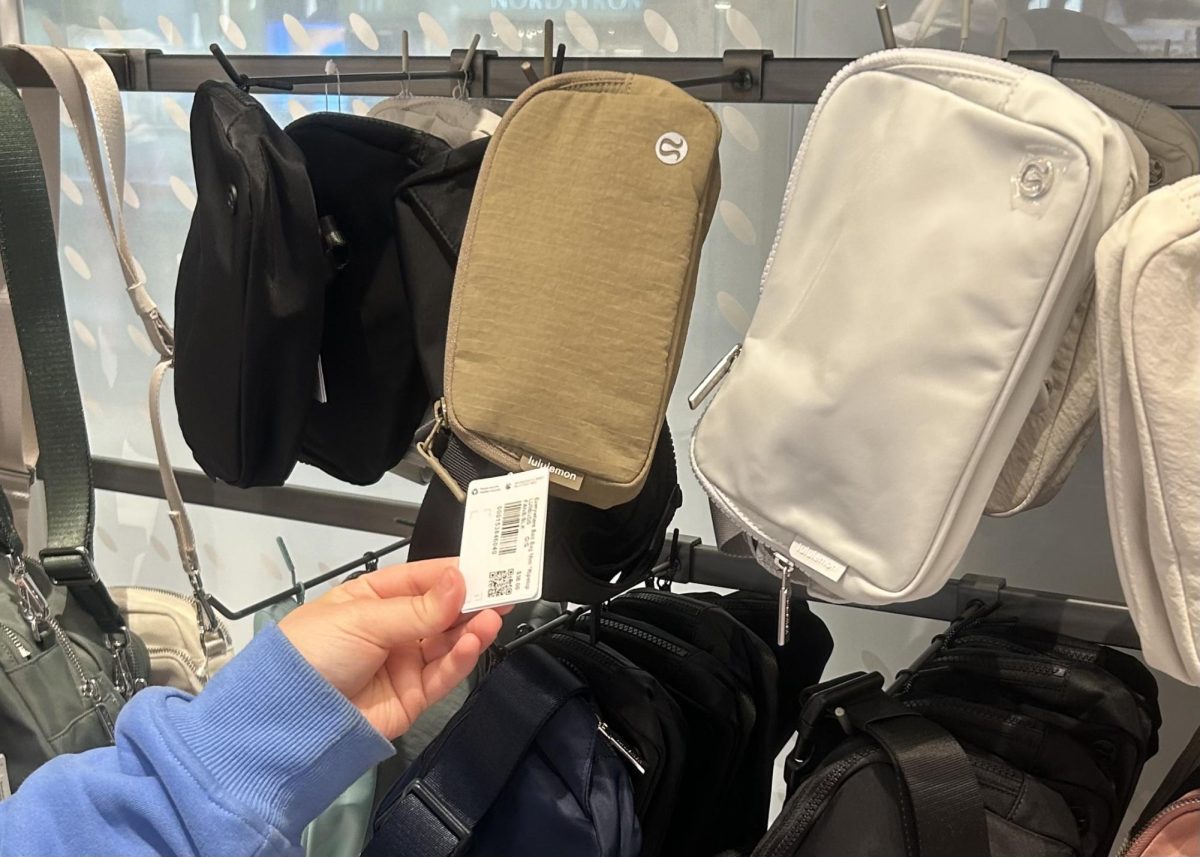The shrill sound of the first bell rings out through the halls, announcing to students that they have five minutes until classes begin. Along with the usual groans of students, typical noises of feet shuffling and the inevitable question of what class students are traveling to, the hiss of a carbonated beverage opening has become increasingly common.
Energy drinks have grown in popularity over recent years, especially among adolescents. The marketing techniques, partnerships and sponsorships used by energy drink companies are unequivocally a cause of the industry’s success.
Virtually every leading drink company has come out with a partnership featuring vastly different, yet still eminent social stars, like entrepreneur Kim Kardashian’s partnership with Alani Nutrition, internet personality Jake Paul’s with Celsius, comedian Kevin Hart’s with C4 Energy, influencer Alix Earle’s with AminoLean and Kansas City Chiefs tight end Travis Kelce’s with Accelerator Energy. Social media poses as a direct pathway to a young audience with over one-third of TikTok users under 19. This marketing technique goes against the American Medical Association publicly supporting a ban on the marketing of energy beverages towards children. Additionally, popular brands such as Alani Nu include double the 100-milligram recommended daily cap of caffeine for minors. Since the rise of celebrity partnerships in 2022, there has also been an increase in the number of calls to Poison Control for children.
Sophomore Aminah Hilaly is active on multiple social media platforms, including Tiktok, where she has seen multiple posts prompting her to try new energy drinks.
“I always see [energy drinks] on TikTok. The advertising is really good, and it makes you want to go and buy them. Most of the time it’s influencers [who] are posting about it, and then you see that everyone’s getting them. It makes me want to try all the new flavors,” Hilaly said.
With the potential sway over society, celebrities are held to a higher standard than the general public and live under constant scrutiny. Due to the significant, career-altering effects that ‘cancel culture’ has proven to have on brands and individuals, many public figures have a publicist or public relations team to step in when their morals and platform are threatened. Considering recent pop-culture controversies, this seems to happen very often. Viewers continue to call out influencers for their lack of transparency, particularly when they aim their content at impressionable young children.
With the average school start time being 8:03 a.m. and the vast majority of students participating in some sort of after-school activity, many feel that energy drinks are the only answer to cure their exhaustion — regardless of the fine print label stating “not recommended for children under 18.”
“[I have energy drinks] every weekday. I think they help give me a little energy at times, especially in the morning.” Hilaly said.
Red Bull, one of the first modern energy beverages and the leading seller as of 2023, has ties to over 15 sports teams and over 800 athletes worldwide. Red Bull also has nearly 40 million combined followers across social media sites Instagram and TikTok. Despite this international recognition, Red Bull has been faced with many multi-million dollar lawsuits, including wrongful death suits, over their products.
Additionally, Panera Bread launched its infamous Charged Lemonade beverages in April 2022. By May 2024, the drinks had already been phased out in the face of mixed reactions. Within that two-year window, the beverages were accused of leaving two individuals dead and another with permanent health defects. One of Panera’s Charged Lemonades could contain up to 390 milligrams of caffeine. A lawsuit filed in October 2023 against the company accuses Panera of not properly labeling the highly caffeinated beverages as energy drinks. Following the lawsuit, Panera made a variety of changes, including updating nutrition information and no longer allowing self-serving capabilities for the beverages, before eventually removing them from the menu. The suit was settled outside of court nearly a year later in Oct. 2024.
“I used to get energy drinks to stay awake and to do my homework. I just felt really tired without them every day. [I would drink them] multiple times a day. I got admitted to the hospital twice because [my heartbeat] was becoming irregular, ” sophomore Sara Ashok said.
Aside from the health lawsuits and concerns, there is also an ethical element to consider. With countless lawsuits and accusations questioning honesty and integrity, energy drink brands have remained consistent in their use of beloved celebrities to advertise their beverages and other supplements to the trusting public.
Prime Hydration, closely affiliated with internet personalities Logan Paul and Olajide “KSI” Olatunji, is currently being sued for falsely stating the amount of caffeine in their beverages. Prime allegedly advertised 200 milligrams of caffeine when their drinks were measured to contain 215-225 milligrams.
Singer-songwriter Tramar Dillard, more commonly known as Flo Rida, sued Celsius in early 2021. Dillard was a long-term brand ambassador for the company from 2014 to 2018 before their partnership was dissolved. Dillard sued Celsius over breach of contract, claiming that Celsius had not paid him the bonuses he was owed. He won the case and $82.6 million and has since announced his own energy drink brand.
Shortly after, Celsius was part of another lawsuit, this time a class-action suit. This comes as a result of the brand stating that its product had no preservatives: it was found to contain citric acid, a commonly used preservative. Celsius and other parties settled the case with a payout of $7.8 million. The decision allows anyone with a receipt who bought a beverage between the dates of Jan. 1, 2015, and Nov. 12, 2022, eligible for a part of this settlement deal. Those who had a valid receipt and purchased a can of Celsius during the time period were eligible to receive $1 per can and those who bought Celsius On-The-Go and Flo Fusion drink powders may have received up to $5 per package.
While these companies have faced years of backlash for the “dangerous” beverages, the honor of celebrities promoting these products also deserves to be called into question. As social media evolves, more users are beginning to call celebrities out for their lack of integrity and transparency. The apparent “money grabs” have become more and more concerning, especially in a reality where we have the ability to connect with anyone across the globe with the click of a button. Influencers can spend hours sanctimoniously preaching their authenticity and gratitude for their followers, but the truth is, viewers will never know the closed-door conversations and what incentives are offered to skew opinions.
In a world where multiple celebrities have more followers on a single app than there are people living in the United States, the power that these otherwise normal people have over society can be colossal. These massive platforms come with great responsibility, as one simple post can alter communities. Despite health and ethical conflicts, the energy drink business continues to grow and reach younger consumers. With the exponential rise of advertisements through social media posts, transparency and the formation of independent beliefs need to be prioritized. Teaching younger generations how to make informed and credible decisions may be able to reduce the damaging effects that blindly following others has had on humanity.
“Knowledge is power. If [students] can understand that there are two sides to everything and [see] the other perspective, then maybe they will make their own educated decision.” Wheeler said.

![Despite the numerous health and ethical concerns of energy drinks, popular influencers still flood their social media platforms with numerous posts, and drinks sell out as energy drink companies continue dropping new flavors. The energy drink industry, worth an estimated $99 billion, has maintained a large growth rate, yet is no stranger to controversy. “[The] curiosity of teens needs to be considered. Showing them other alternatives that are safer — like a small cup of coffee — or having them research and discover on their own [would be safer,]" health teacher Jessica Wheeler said.](https://pwestpathfinder.com/wp-content/uploads/2024/11/DSC0038-2-1200x800.jpg)

![Sophomore Maryem Hidic signs up for an academic lab through Infinite Campus, a grading and scheduling software. Some students enjoyed selecting their responsive schedule in a method that was used school-wide last year. “I think it's more inconvenient now, because I can't change [my classes] the day of, if I have a big test coming and I forget about it, I can't change [my class],” sophomore Alisha Singh said.](https://pwestpathfinder.com/wp-content/uploads/2025/10/DSC_0012-1200x801.jpg)
![Senior Dhiya Prasanna examines a bottle of Tylenol. Prasanna has observed data in science labs and in real life. “[I] advise the public not to just look or search for information that supports your argument, but search for information that doesn't support it,” Prasanna said.](https://pwestpathfinder.com/wp-content/uploads/2025/10/DSC_0073-2-1200x800.jpg)
![Junior Fiona Dye lifts weights in Strength and Conditioning. Now that the Trump administration has instituted policies such as AI deregulation, tariffs and university funding freezes, women may have to work twice as hard to get half as far. "[Trump] wants America to be more divided; he wants to inspire hatred in people,” feminist club member and junior Clara Lazarini said.](https://pwestpathfinder.com/wp-content/uploads/2025/05/Flag.png)
![As the Trump administration cracks down on immigration, it scapegoats many immigrants for the United States’ plights, precipitating a possible genocide. Sophomore Annabella Whiteley moved from the United Kingdom when she was eight. “It’s pretty scary because I’m on a visa. When my visa expires next year, I’m not sure what’s going to happen, especially with [immigration] policies up in the air, so it is a concern for my family,” Whiteley said.](https://pwestpathfinder.com/wp-content/uploads/2025/05/DSC_0077-7copy.jpg)
![Shifting global trade, President Donald Trump’s tariffs are raising concerns about economic stability for the U.S. and other countries alike. “[The tariffs are] going to pose a distinct challenge to the U.S. economy and a challenge to the global economy on the whole because it's going to greatly upset who trades with who and where resources and products are going to come from,” social studies teacher Melvin Trotier said.](https://pwestpathfinder.com/wp-content/uploads/2025/05/MDB_3456-1200x800.jpg)



![Some of the most deadly instances of gun violence have occurred in schools, communities and other ‘safe spaces’ for students. These uncontrolled settings give way to the need for gun regulation, including background and mental health checks. “Gun control comes about with more laws, but there are a lot of guns out there that people could obtain illegally. What is a solution that would get the illegal guns off the street? We have yet to find [one],” social studies teacher Nancy Sachtlaben said.](https://pwestpathfinder.com/wp-content/uploads/2025/01/DSC_5122-1200x800.jpg)

